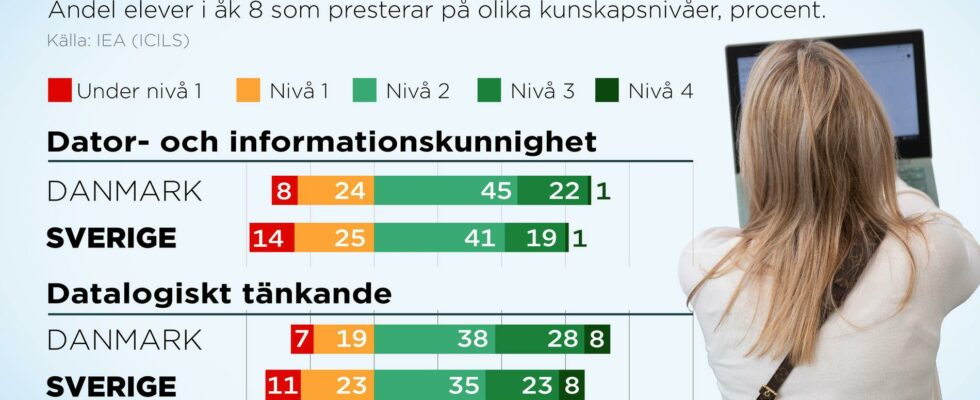unsaveSave
expand-left
full screen
chevron-rightnext
Percentage of students in year 8 in Sweden and Denmark who perform at different levels of knowledge, percentage.
1 / 2Photo: Anders Humlebo/TT
Many Swedish eighth-graders cannot cope with simpler IT-related tasks, an international study shows.
But what are they expected to know? And would you pass the test yourself?
The international study Icils 2023 was recently presented and showed that four out of ten Swedish eighth graders do not reach basic knowledge in computer and information literacy. Three out of ten have low or very low knowledge of the basics of programming.
But what should an eighth grader know? Of course, no test can capture exactly what is taught in all the different school systems around the world. But the responsible research organization IEA has drawn up a framework in consultation with experts from each country, roughly 30 countries participated. The framework boils down to concrete tasks for the students.
Open a link
Here are some examples in the part that deals with digitally searching, evaluating, processing and presenting information. The tasks become more difficult as time goes by. Can you handle these?
Level 1:
Open a link in a browser.
Record the main message from a video.
Level 2:
Find information on a website with multiple web pages.
Insert information into a specific cell in a spreadsheet.
Level 3:
Assess the reliability of the information on a website, where anyone can edit the content.
Using a map program to draw a route based on written information.
Level 4:
Explain how passwords can be encrypted.
Assess the reliability of information on a commercial website, which promotes a particular product.
Select relevant images or illustrations to support text on a self-created poster.
Program drones
Swedish students also participated in the voluntary part of the test, about the basics of programming. In Sweden, programming is included in the mathematics and technology subjects, but it can be noted that 13 percent of the Swedish eighth graders stated that they had never been taught programming.
The test tasks in this part ranged in level from creating a simple algorithm to programming an imaginary agricultural drone to both water and fertilize according to given instructions.
Eight percent of the Swedish students performed at advanced level. That is slightly higher than the international average of six percent.
FACTS
Icils (International Computer and Information Literacy Study) examines the digital competence of eighth graders.
The international research organization IEA is responsible for the study.
The Swedish National Agency is responsible for the Swedish part.
The study has been carried out in 2013, 2018 and 2023.
More than 30 countries have participated in Icils 2023. Sweden was involved for the first time.
Icils is the first major test of Swedish students’ digital competence.
Read more
